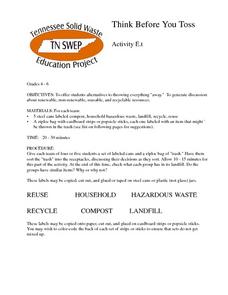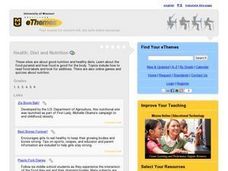Curated OER
Termite Trails
Students observe the behavior of termites and draw conclusions about their behavior. They record data as to termite behavior and recognize elements in the experimental design which must include a hypothesis.
Curated OER
Snacks 'R Us
First graders experiment with fat content by analyzing snack foods. They learn what makes up a nutritious snack.
Curated OER
Nest Construction and Area Management Activities
Students construct a nest for a fictitious ground-nesting bird.They create models of the bird (along with its eggs) that might theoretically live in this habitat. They write in a daily journal about what happens to their nests in a...
Curated OER
Mater Your Munchies
Students explore the various food groups while doing a physical activity.
Curated OER
Tape Toes & Rubberband Hands
Students learn the proper form for throwing. Correct hand placement is demonstrated as imaginary and then real objects are thrown at a target. Tape is placed on one shoe and referred to as the tape toe to get the student in position for...
Curated OER
Creating Communities
Students design a community with minimal environmental impact. They rate each other's community's presentation using the "Planning and Zoning Commission Rating Scale".
Curated OER
Think Before You Toss
Students sort a variety of trash items and determine thier sorting decisions.
Curated OER
The Principles Of Composting
Students put items in a plastic bag and watch the effects of composting. While completing the experiment, students answer questions and ask permission to start their own compost pile at home.
Curated OER
Ecosystem Soil Study
Sixth graders take soil samples and analyze the samples and ecosystems found within them.
Curated OER
Why Is An Apple Like A Suitcase?
Young scholars examine a variety of fruit to discover that each has seeds. Through experimentation, they discover the role that fruit and seeds play in a plant's life cycle.
Curated OER
Health: Diet and Nutrition
Learners access a variety of nutrition and health related resources on the Internet. They examine the food pyramid, match food groups, play interactive games, read an online story, analyze the labels on food packaging, and take a...
Curated OER
Name Squares
Students examine the sounds the letters of their name make. They read Dr. Seuss' ABC Book and Mary Engelbreit's Put Em All Together. They practice writing the individual letters of their names in squares.
Curated OER
Finding and Collecting in the Field
Young scholars examine the types of plants brought over to America from immigrants. They research how some of these types of plants cause damage and alter the landscape. They record data and share the information with the community.
Curated OER
Interpreting Aerial Photographs
Students interpret aerial photographs. They view aerial photographs or satellite-produced images to locate and identify physical and human features. They study satellite images and label their images for bodies of water, clouds,...
Curated OER
Ocean Market
Students research how: The ocean is the source of many materials, from ores mined from its depths to relaxing mineral salts for a bath. Exquisite mother-of-pearl inlay, decorative shells, and pearl jewelry are found in gift shops...
Curated OER
Garden Journals
Students create "Garden Journals" using construction paper, poster board, and general art supplies in this Art, Science, Reading, and Writing lesson for the early-elementary classroom. This activity may be done at the beginning of the...
Curated OER
Media Collage
Learners create "media Collages" out of labels from boxes, bottles, and cans, and other found objects in this Art lesson for all ages. Adaptations are included for younger and older students. Lesson also includes a writing option for...
Curated OER
Water Pollution
Fifth graders examine what contaminated water looks like, and how it becomes polluted. They examine a teacher demonstration of water is not polluted but does contain rocks and other things that do need to be cleaned out before drinking...
Curated OER
A Funky Healthy Life Style!
Students name the five food groups and classify foods according to group. They tell how proteins, carbohydrates, vitamins/minerals, and water help their body. Students discuss how play and exercise can help their body.
Curated OER
Science: Liquid Matter
Second graders examine the properties of liquids and their classifications. They compare and contrast cups of different liquids and record their findings in journals. Students observe how liquids flow at various speeds and that unlike...
Curated OER
Heritage: What if the Mormons had not come to Utah?
Fourth graders use critical thinking, evaluation, and geography skills to find alternative locations that Brigham Young could have taken the Mormons to settle. They present their findings to Brigham Young and the class with a short...
Curated OER
Earth Day Crossword
In this crossword puzzle worksheet, students read the 25 clues about Earth Day. Students then complete the crossword puzzle about Earth Day.
Curated OER
Looking at Photographs
Sixth graders evaluate photographs as historical documents. In this social studies lesson, 6th graders analyze photographs as propaganda.

























